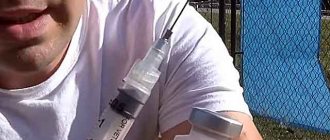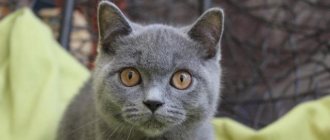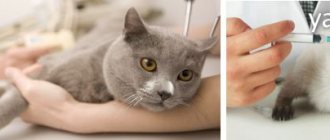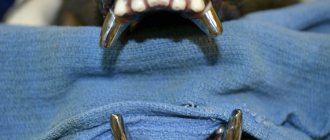Home » Useful Information
A kitten is a small, fragile and fragile animal that has recently stopped depending on its mother’s milk.
His immunity is still weak, he has not fully strengthened, so it is important not only to closely monitor the cleanliness of the place where the pet is kept and its contacts with other animals, but also to carry out vaccinations on time that will protect the small body from serious diseases.
Vaccination is done for representatives of all breeds, be it hairless Peterbalds and Don Sphynxes , especially large Ragdolls and Maine Coons , or exotic toygers with Egyptian Mau .
Before you go to the doctor or vaccinate yourself, you need to make sure that the baby is completely healthy and alert
- 2 When to give a kitten the first and subsequent vaccinations
- 3 When should a kitten be vaccinated against rabies?
- 4 Rules for vaccinations - what should not be forgotten
Why are vaccinations needed?
Even in early childhood, a cat needs to strengthen its immunity and reduce the risk of possible diseases. Even if the cat has not crossed the threshold of the house, it is not completely safe from viruses.
Kittens are required to be vaccinated so that their body can produce antibodies to protect against infections. Animals are administered polyvalent and monovalent live inactivated vaccines.
Drugs
What vaccinations do kittens get?
The vaccination schedule for all kittens is the same, only changes in the choice of components are possible. When the time comes to give the kitten the first vaccinations, the doctor must know about the owner’s plans for the baby and choose which components to include in the drug.
Will the cat permanently live in an apartment, will it be possible for him to visit the street (it cannot be guaranteed that the cat will never be outside the house), will he participate in exhibitions, is it planned to use him to produce offspring.
Every domestic kitten or adult, regardless of lifestyle, must be vaccinated against 4 viruses:
- Calcivirus.
- Panleukopenia (distemper).
- Herpesvirus (rhinotracheitis).
- Rabies virus.
If the owners plan to regularly walk the kitten in the future, it must be additionally vaccinated:
- For ringworm.
- From trichophytosis microsporia.
If the cat will represent the breed on the podium or act as a producer, in addition to the mandatory vaccines, it needs regular vaccinations:
- For leukemia virus (FeIV).
- From chlamydia.
Ringworm
At what age do the first vaccinations take place?
From a mother cat who has been vaccinated, the baby receives antibodies through mother's milk. His body will develop immunity against the diseases against which the cat received the vaccine and the first vaccination can be given to him at the age of 3 months.
If the mother is unknown or has not been vaccinated, kittens begin to be vaccinated when they are 2 months old. It is at this age that the kitten’s immunity received from its mother begins to weaken, and the cub becomes vulnerable to pathogenic agents.
In the future, for the safety of the pet and maintaining the body’s defenses, the rules and timing of vaccination must be observed.
When not to vaccinate
There are situations when cat vaccination is postponed for some time. This happens if:
- the cat is pregnant or nursing kittens;
- antibiotic therapy has been administered (vaccination is postponed for a couple of weeks);
- there was contact with a sick animal (in this case it is necessary to wait for the incubation period).
If there is a risk of getting a disease, you can use a special drug that will support the animal’s immunity.
Vaccination schedule for cats
Vaccination of cats is carried out according to the scheme:
- 8 weeks – mandatory vaccination for all kittens, protecting against calcivirosis, panleukopenia and rhinotracheitis. If necessary, use drugs against leukemia and chlamydia. 1 injection is performed.
- At 12 weeks , the same medications are used, but a rabies vaccination is added. 2 injections are performed (complex vaccination for cats and rabies vaccination).
Subsequent vaccinations are given after 12 months and then annually, repeating all the components that were used at 12 weeks.
Sometimes circumstances arise when it is impossible to carry out preventive measures on time. In each individual case, the decision to reschedule is made by the doctor, taking into account possible changes in the cat’s condition and in its lifestyle.
Immune activation occurs two weeks after the injection. During this time, it is necessary to monitor the cat, provide it with adequate nutrition, and protect it from stressful situations, hypothermia, and water treatments.
Chlamydia
Vaccination table for cats by age
| Disease | Primary vaccination (age) | Secondary vaccination | Revaccination |
| Rhinotracheitis | 8, 12 weeks | in 2, 4 weeks | annually |
| Rabies | 12 weeks | not required | Annually or once every 3 years |
| Calcivirosis | 8, 12 weeks | in 2, 4 weeks | annually |
| Chlamydia | 8, 12 weeks | in 2, 4 weeks | annually |
| Panleukopenia | 8, 12 weeks | in 2, 4 weeks | annually |
Important! Rabies injections must be administered to all domestic cats without exception, due to the particular danger of the disease not only for the animal, but also for humans! The virus is persistent in the external environment. There is no treatment for rabies in humans.
Types of drugs for vaccination
It was said above that the virus in the vaccine can be weakened (live) or dead. Live vaccines are made from weakened apathogenic pathogens that do not lose their ability to reproduce, but cannot cause harm. In order for the vaccine to remain effective, live vaccines are stored and transported at low temperatures (within 4-8°C) or frozen.
Live vaccines include anti-lichen vaccinations. More often, such vaccinations are given for therapeutic rather than preventive purposes.
global $ads_google; //data-ad-slot=”2475549904″ $ads_google = empty($ads_google) ? false : true; ?> if ($ads_google == false) {?>
$ads_google = true; ?> } ?>
Dead vaccines, killed by various methods, cause an immediate immune response. Inactivated pathogens contain drugs against panleukopenia, rabies, leukemia, rhinotracheitis, calicivirus and chlamydia.
Vaccine for kittens
- Nobivak Triket vaccine is used against viral rhinotracheitis, calcivirosis, and panleukopenia. Administered to kittens aged 9-12 weeks. Revaccination is carried out 2-4 weeks after vaccination.
- The Fel-o-Vax vaccine is used against viral rhinotracheitis, calcivirosis, panleukopenia, and chlamydia. It is administered to kittens at the age of 8 weeks. Revaccination is carried out 3-4 weeks after vaccination.
- Nobivak Rabiez vaccine is used against rabies. Administered to kittens at 12 weeks of age. Revaccination is not carried out.
- The Multifel-4 vaccine is used against viral rhinotracheitis, calcivirosis, panleukopenia, and chlamydia. Administered to kittens aged 8-12 weeks. Revaccination is carried out 3-4 weeks after vaccination.
- Microderm vaccine is used against trichophytosis microsporia. It is administered to kittens at the age of 6-8 weeks. Revaccination is carried out 2-3 weeks after vaccination.
Today, high-quality complex vaccination for cats with the drug Purevax (manufactured in France) is widely used due to the fact that one dose includes 4 components against major diseases: herpesvirus, calcevirus, panleukopenia, chlamydia.
The advantage of the drug is the possibility of its use simultaneously with the Rabizin vaccine (against rabies) and the vaccine against feline viral leukemia, subject to separate administration.
After vaccination, the cat may show lethargy, loss of appetite, an increase in body temperature, pain at the injection site, vomiting, and diarrhea.
Grafting
Attention! If, after the injection, side effects or other deviations from the pet’s normal condition are noticed, you should immediately consult a doctor! You cannot give your cat any medications on your own in an attempt to improve the situation!
If the reason for the deterioration of the condition is an allergic reaction, the doctor will replace the drug and use another vaccine in the future.
Possible side effects
Side effects are typical for any effect on the body. They are divided into light (non-hazardous) and heavy. The former disappear on their own, while the latter can only be eliminated with the help of medical intervention.
Why you can’t vaccinate an animal yourself
Veterinarians do not recommend vaccinating your pet yourself. Any mistake, often made with little experience, is fraught with serious side effects. Lack of comprehensive diagnosis may result in the adoption of an unhealthy cat. In such cases, a complicated course of the disease is observed with a high probability of death.
At home, there is no one to provide emergency assistance in case of an allergic reaction. You will also lose your veterinary passport, which must be filled out strictly at the clinic.
What post-vaccination symptoms indicate danger?
After vaccination, loss of activity and appetite, a slight rise in temperature, temporary lameness and the formation of a slight swelling at the injection site are allowed. The condition returns to normal within 1-4 days on its own.
If preparatory measures are followed, the likelihood of severe side effects
decreases to 0.5-1%. These include:
- progressive deterioration of the condition;
- persistence of swelling for more than a week with gradual growth and the appearance of suppuration;
- allergic reaction.
If any of these symptoms appear, be sure to contact your veterinarian. To avoid choking, which is typical of allergies, be sure to give your cat an antihistamine.
Who can you trust to vaccinate?
In a veterinary clinic, a doctor performs a professional examination of a small patient. For vaccination, high-quality and proven drugs are used, stored in compliance with the required temperature conditions. After the procedure, a veterinary passport is prepared accordingly: an entry is made, a stamp and signature of the responsible person are affixed.
Rules for cat vaccination:
- Vaccinations are given only to completely clinically healthy individuals who have been treated against external and internal parasites (10-14 days before the event).
- It is not recommended to vaccinate a kitten during the period when it is teething (from 4 to 7 months).
- You cannot vaccinate during the postoperative period. Surgical interventions are also prohibited immediately after vaccination (within 30 days). The exception is those cases when the operation is necessary to save the life of the animal.
- You cannot vaccinate a pregnant or lactating cat. The animal must receive the vaccine one month before mating.
- You cannot vaccinate if shortly before the event the cat had contact with stray animals. The event is postponed for 2 months while monitoring the kitten’s health.
- A week before and after vaccination, the cat should avoid stressful situations.
How to prepare an animal for vaccination?
Before vaccination, kittens need special training. It includes several important points:
- deworming – expulsion of worms;
- prevention of parasitic infections;
- examination of the animal immediately before administration of the drug.
Kittens are dewormed one and a half weeks before the first vaccination. To do this, it is better to use anthelmintic drugs in tablet form or in the form of syrup, in particular, Febtal, Dirofen, Prazitel, Panacur, Pirantel. Getting rid of intestinal parasites promotes better absorption of the vaccine and the development of lasting immunity. Before revaccination, deworming will not be necessary. It is recommended that adult pets undergo deworming one and a half weeks before each vaccination.
As you know, fleas and ticks greatly weaken the immune system of animals. Therefore, before vaccination, prevention of such diseases should be carried out so that the body has the opportunity to develop adequate reactivity to infectious diseases.
An important part of preparing for immunization is examining your pet immediately before the injection. Such an event is carried out by a qualified specialist, he assesses the general health of his patient, measures his body temperature, makes sure that the kitten does not have pathological discharge from the nose, eyes, etc.











